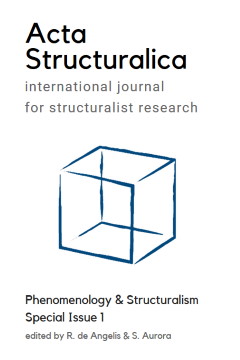0Structural phenomenology is both a general theory of experience and a scientific method, whose contours and potentially considerable explanatory power have been obscured by its complex historical genesis. Barring a few partial or indirect attempts (e.g. Holenstein 1976, Piana 1996, Coquet 2007, Groupe µ 2015), no direct analysis and certainly no synthetic account of its core tenets have of yet been provided. Indeed, structural phenomenology has never been framed explicitly as a coherent tradition, theory or model in its own right. Rather, the term seems to refer only to the indefinite conceptual space where structuralism and phenomenology have on occasion intersected. Given that Edmund Husserl, Gestalt psychology, Roman Jakobson, Maurice Merleau-Ponty or Jacques Derrida all provide examples of productive convergences or intersections between these two traditions, it is nonetheless clear that what one might want to call « structural-phenomenological thought » constituted not a fleeting or marginal episode in 20th Century intellectual history, but a persistent undercurrent. As we hope to make clear, moreover, it is possible not only to identify a number of common ideas in the nexus of exchanges between phenomenological and structuralist approaches, but also to distill these ideas into a set of consistent principles that in turn provide an outline of structural phenomenology as a coherent theory and method.
Principles of structural phenomenology
a basic outline and commentary
pp. 151-169
Abstract
Structural phenomenology is both a general theory of experience and a scientific method, whose contours and potentially considerable explanatory power have been fundamentally obscured by its complex historical genesis. Barring a few partial or indirect attempts (Holenstein 1976, Piana 1996, Coquet 2007, Groupe µ 2015), no explicit analysis and certainly no synthetic account of its core tenets have been provided. Indeed, structural phenomenology has generally not been framed as a coherent tradition, theory or model in its own right. At best, the term seems to refer only to the indefinite conceptual space where structuralism and phenomenology have on occasion intersected. Because the works of Edmund Husserl, the Gestalt psychologists, Roman Jakobson, Maurice Merleau-Ponty or Jacques Derrida all provide, to varying extents, strong examples of productive convergences or intersections between these two traditions, it is nonetheless quite clear that explorations of structural-phenomenological ideas constituted not a fleeting episode, but a persistent undercurrent in 20th Century European intellectual history. As we hope to clarify here, moreover, it is possible not only to isolate a number of defining ideas in this existing nexus of exchanges between phenomenological and structuralist approaches, but also to distill these ideas into a set of consistent principles that can provide a first outline of the theoretical scope of structural phenomenology.
References
Aurora Simone (2017) Filosofia e scienze nel primo Husserl: Per una interpretazione strutturalista delle Ricerche logiche. Padova, Cleup.
Coquet Jean-Claude (2007) Phusis et Logos: une phénoménologie du langage. Paris, Presses Universitaires de Vincennes.
Derrida Jacques (2005) Writing and difference. London-New York, Routledge.
Espagne Michel (2014) L'ambre et le fossil: Transferts germano-russes dans les sciences humaines XIXe-XXe siècle. Paris, Armand Colin.
Fine Kit (1995) „Part-Whole“, In: B. Smith & D.W. Smith (eds.), The Cambridge companion to Husserl, Cambridge, Cambridge University Press, n/a.
Flack Patrick (2018) Idée, expression, vécu: La question du sens entre phénoménologie et structuralisme. Paris, Hermann.
Groupe µ (2015) Principia semiotica. Paris, Les impressions nouvelles.
Hjelmslev Louis (1961) Prolegomena to a theory of language. Madison, University of Wisconsin Press.
Holenstein Elmar (1976) Roman Jakobson's approach to language: phenomenological structuralism. Bloomington, Ind., Indiana University Press
Husserl Edmund (1982) Ideas pertaining to a pure phenomenology and to a phenomenological philosophy I: General introduction to a pure phenomenology. Den Haag, Nijhoff.
Husserl Edmund (2001) Logical investigations. London, Routledge.
Jakobson Roman (1971) Word and language. The Hague, Mouton.
Jakobson Roman (1981) Poetry of grammar and grammar of poetry. The Hague-Paris-New York, Mouton.
Jakobson Roman (1979) Poetik: Ausgewählte Aufsätze 1921-1971, ed. Holenstein Elmar, Schelbert Tarcisius. Frankfurt am Main, Suhrkamp.
Piana Giovanni (1996) „Die Idee eines phänomenologischen Strukturalismus“, In: R. Cristin (Hrsg.), Phänomenologie in Italien, Würzburg, Königshausen & Neumann, 113–118.
Piana Giovanni (2013) „L'idea di uno strutturalismo fenomenologico“, In: G. Piana, Strutturalismo fenomenologico e psicologia della forma, Morrisville, NC, Lulu Press, 5–15.
Pos Hendrik (2013) „Phénoménologie et linguistique“, In: H. Pos, Ecrits sur le langage, Genève-Lausanne, sdvig press, 193–206.
Sériot Patrick (1999) Structure et totalité: Les origines intellectuelles du structuralisme en Europe centrale et orientale. Paris, Presses Universitaires de France.
Sonesson Göran (2012) „The meanings of structuralism: Considerations on structures and Gestalten“. Segni e comprensione 26 (78), 84–101.
Publication details
Published in:
De Angelis Rossana, Aurora Simone (2018) Phenomenology and structuralism. Acta Structuralica Special Issue 1.
Pages: 151-169
Online since: 18th April 2018
DOI: 10.19079/actas.2018.s1.151
Full citation:
Aurora Simone, Flack Patrick (2018) „Principles of structural phenomenology: a basic outline and commentary“. Acta Structuralica 1, 151–169.


